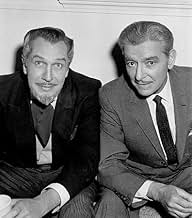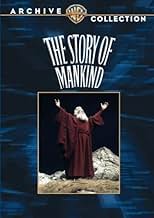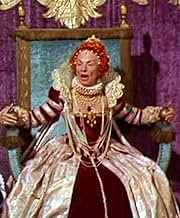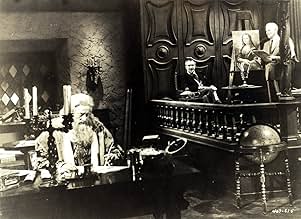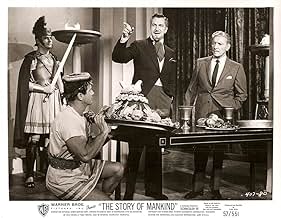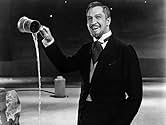AVALIAÇÃO DA IMDb
4,8/10
1,6 mil
SUA AVALIAÇÃO
Adicionar um enredo no seu idiomaThe Devil and the Spirit of Man argue as to whether or not humanity is ultimately good or evil.The Devil and the Spirit of Man argue as to whether or not humanity is ultimately good or evil.The Devil and the Spirit of Man argue as to whether or not humanity is ultimately good or evil.
- Direção
- Roteiristas
- Artistas
- Direção
- Roteiristas
- Elenco e equipe completos
- Produção, bilheteria e muito mais no IMDbPro
Avaliações em destaque
THE STORY OF MANKIND (1957) is a very elusive all-star misfire about a heavenly debate over should earth survive or be wiped out. For the defense, you have the Spirit of Man (Ronald Colman), for the prosecution, you have Satan (Vincent Price having a ball!) They each call examples of humanity by showing famous good and evil people. We see little skits involving Nero (Peter Lorre making googly-eyes at members of an orgy!) Napoleon (22 year old Dennis Hopper playing the part like a naughty frat boy!) Christopher Columbus (miscast Chico Marx), Issac Newton (even more miscast Harpo Marx!) The cast gets stranger and stranger. Aging Hedy Lamarr as Joan of Arc? Where was everybodies agent? The end result looks like the biggest celebrities in Hollywood are doing a 5th graders' play! An amazing film, a tape I treasure!
THE STORY OF MANKIND (1957) is not a good movie, but it's a fascinating one on several levels. I'm most intrigued by the central event of the film, a debate over the fate of mankind undertaken, in a heavenly tribunal, between the "Spirit of Man," played by stately English actor Ronald Colman (in his final film), and a rather more sinuous type, Mr. Scratch (aka the Devil), played by Vincent Price on the cusp of his emergence as a major horror star. Colman speaks in defense of mankind, while Price argues for allowing the species' impending self-engineered demise. (This was the Atomic Age, after all.) Price offers concrete examples of man's inhumanity to man (and nature) and the various atrocities the race has committed, establishing a whole pattern of misconduct—theft, exploitation, slavery, mass murder, rape, pillage, plunder, perversion--that extends from Ancient Egypt right up to the present day. Colman glosses over these things, preferring to expound rather vaguely on man's lofty ideals and dreams of progress, exploration, and artistic achievement. When Colman brings up Leonardo da Vinci, for instance, Price points to da Vinci's detailed plans for highly destructive weapons of war. Price seems much more outraged by the crimes of mankind than Colman is, which marks his character as the true moralist in the film.
(In real life, Colman and Price were good friends and one exchange of dialogue in the da Vinci scene, where Colman insists that Price "knows nothing about painting," while Price responds that he "never pretended to be an art expert," is an in-joke reference to Price's already considerable reputation by that point as a connoisseur, collector and historian of art.)
On a more mundane note of cinephilic appreciation, I tried tallying up all the footage taken from earlier movies with historical themes. (Any time you see a shot with multiple extras and lavish sets, you know it's from a different movie.) Early on, for instance, we see John Carradine as the pharaoh, Khufu, sharing a scene with Price and Cedric Hardwicke (as the celestial judge). All three were in Cecil B. DeMille's spectacle from the previous year, THE TEN COMMANDMENTS (1956), which took place in Ancient Egypt. Yet when this scene transitions to shots of pyramid building, they don't use clips from DeMille's film, but instead rely on clips from another film set in that period—LAND OF THE PHARAOHS (1955). Why? Because THE STORY OF MANKIND is a Warner Bros. production and the only color film clips they could use without having to pay exorbitant fees would have to come from Warner Bros. films. So when they go to the Trojan War, we see clips from HELEN OF TROY (1955). And when they go to the Crusades and other scenes from the Middle Ages, we see clips from KING RICHARD AND THE CRUSADERS (1954). Piracy and ship battles between England and Spain for supremacy of the seas? CAPTAIN HORATIO HORNBLOWER (1951). Elizabethan England? THE PRIVATE LIVES OF ELIZABETH AND ESSEX (1939). Western scenes? DODGE CITY (1939). There were some clips I didn't recognize, though, such as the shot of Rome burning. (QUO VADIS?, 1951, was an MGM production.) Producer-director Irwin Allen would expand on this practice of mixing cheaply shot studio scenes with more lavishly filmed clips in his TV series, "Time Tunnel," some nine years later. (By then, of course, Allen would be at a different studio and have to rely on clips solely from 20th Century Fox.)
The recent cablecast of this film on Turner Classic Movies (on March 14, 2011) was beset by technical problems. The film often froze up and went black. This happened most egregiously during two sequences, one with Cleopatra (Virginia Mayo) and one with Peter Minuit (Groucho Marx), so I missed several seconds from each. I must say I didn't recognize Ms. Mayo in the dark wig. In another sequence, 45-year-old Hedy Lamarr turns up as the teenaged Joan of Arc(!). Marie Windsor plays a much taller and older Josephine to Dennis Hopper's Napoleon. (Josephine actually WAS taller and older than Napoleon, but not by that much.) Shakespeare is described by Queen Elizabeth (Agnes Moorehead) as a "young actor-poet," but is played by veteran character actor Reginald Gardiner, who'd been in films for 25 years at this point. Why couldn't they recruit bigger names to play Shakespeare and such other key historical figures as Columbus (Anthony Dexter) and Lincoln (Austin Green)?
Silent star Francis X. Bushman (Messala in the silent BEN-HUR) plays da Vinci—and has no dialogue. Cathy O'Donnell plays an early Christian in Rome some two years before appearing in a vaguely similar role in the BEN-HUR remake. In one piece of gimmick casting, Jim Ameche appears as Alexander Graham Bell, a role closely identified with his more famous brother, Don Ameche. (I'm guessing they tried to get Don to recreate it, but were turned down.) Seven actors in this cast went on to guest star on TV's "Batman": Vincent Price, Cesar Romero, Reginald Gardiner, Edward Everett Horton, Francis X. Bushman, Marie Windsor and Ziva Rodann.
For years I only knew this film as the last to feature all three Marx Brothers. On that basis, I'd always thought it was a comedy. It isn't. Still, it struck me as pretty funny to see an opening credits sequence where Francis X. Bushman, Franklin Pangborn and Dennis Hopper are among the many listed together ABOVE the title.
(In real life, Colman and Price were good friends and one exchange of dialogue in the da Vinci scene, where Colman insists that Price "knows nothing about painting," while Price responds that he "never pretended to be an art expert," is an in-joke reference to Price's already considerable reputation by that point as a connoisseur, collector and historian of art.)
On a more mundane note of cinephilic appreciation, I tried tallying up all the footage taken from earlier movies with historical themes. (Any time you see a shot with multiple extras and lavish sets, you know it's from a different movie.) Early on, for instance, we see John Carradine as the pharaoh, Khufu, sharing a scene with Price and Cedric Hardwicke (as the celestial judge). All three were in Cecil B. DeMille's spectacle from the previous year, THE TEN COMMANDMENTS (1956), which took place in Ancient Egypt. Yet when this scene transitions to shots of pyramid building, they don't use clips from DeMille's film, but instead rely on clips from another film set in that period—LAND OF THE PHARAOHS (1955). Why? Because THE STORY OF MANKIND is a Warner Bros. production and the only color film clips they could use without having to pay exorbitant fees would have to come from Warner Bros. films. So when they go to the Trojan War, we see clips from HELEN OF TROY (1955). And when they go to the Crusades and other scenes from the Middle Ages, we see clips from KING RICHARD AND THE CRUSADERS (1954). Piracy and ship battles between England and Spain for supremacy of the seas? CAPTAIN HORATIO HORNBLOWER (1951). Elizabethan England? THE PRIVATE LIVES OF ELIZABETH AND ESSEX (1939). Western scenes? DODGE CITY (1939). There were some clips I didn't recognize, though, such as the shot of Rome burning. (QUO VADIS?, 1951, was an MGM production.) Producer-director Irwin Allen would expand on this practice of mixing cheaply shot studio scenes with more lavishly filmed clips in his TV series, "Time Tunnel," some nine years later. (By then, of course, Allen would be at a different studio and have to rely on clips solely from 20th Century Fox.)
The recent cablecast of this film on Turner Classic Movies (on March 14, 2011) was beset by technical problems. The film often froze up and went black. This happened most egregiously during two sequences, one with Cleopatra (Virginia Mayo) and one with Peter Minuit (Groucho Marx), so I missed several seconds from each. I must say I didn't recognize Ms. Mayo in the dark wig. In another sequence, 45-year-old Hedy Lamarr turns up as the teenaged Joan of Arc(!). Marie Windsor plays a much taller and older Josephine to Dennis Hopper's Napoleon. (Josephine actually WAS taller and older than Napoleon, but not by that much.) Shakespeare is described by Queen Elizabeth (Agnes Moorehead) as a "young actor-poet," but is played by veteran character actor Reginald Gardiner, who'd been in films for 25 years at this point. Why couldn't they recruit bigger names to play Shakespeare and such other key historical figures as Columbus (Anthony Dexter) and Lincoln (Austin Green)?
Silent star Francis X. Bushman (Messala in the silent BEN-HUR) plays da Vinci—and has no dialogue. Cathy O'Donnell plays an early Christian in Rome some two years before appearing in a vaguely similar role in the BEN-HUR remake. In one piece of gimmick casting, Jim Ameche appears as Alexander Graham Bell, a role closely identified with his more famous brother, Don Ameche. (I'm guessing they tried to get Don to recreate it, but were turned down.) Seven actors in this cast went on to guest star on TV's "Batman": Vincent Price, Cesar Romero, Reginald Gardiner, Edward Everett Horton, Francis X. Bushman, Marie Windsor and Ziva Rodann.
For years I only knew this film as the last to feature all three Marx Brothers. On that basis, I'd always thought it was a comedy. It isn't. Still, it struck me as pretty funny to see an opening credits sequence where Francis X. Bushman, Franklin Pangborn and Dennis Hopper are among the many listed together ABOVE the title.
The technological development of the H-Bomb has caused the court of heaven to put mankind on trial.
Should man not be-allowed to proceed with his new invention or should he be allowed to blow himself to eternity? Somewhere in outer space (for it could hardly be held in heaven) the trial of the centuries takes place. Arguing for allowing man to blow himself up is Scratch (Vincent Price). Arguing for the goodness of mankind is The Spirit of Mankind (Ronald Coleman).
Scratch and Mankind then take the court (and the audience) on a tour throughout history showcasing some of the most interesting and important events and people that have shaped the world in which we live. The premise of the film is similar to a Star Trek: The Next Generation episode where Picard and the Enterprise crew have to defend the obliteration of mankind from a high powerful being known as Q who has put mankind on trial.
It is a film that touches on philosophical and theological issues but is more interested in highlighting historical events so it doesn't become a deep spiritual film filled with profound thought and insight. It starts out with an interesting premise, but as it travels along through history, although still interesting, seems somewhat respective and begins to be a tad bit tedious and thus maybe a little bit boring.
Of the more interesting moments includes Groucho Marx as Peter Minuit who swindled Manhattan Island from the Indians and Harpo Marx as Isaac Newton. Chico Marx plays a monk advising Christopher Columbus about why sailing across the world would be a bad idea. How can you go wrong with the Marx Brothers.
Overall 'The Story of Mankind' is interesting enough to watch especially if it is in a history class. It could have kept the hosts and perhaps could have had more engaging portraits of history. It has a fun premise and some good dialogue between Scratch and Mankind. But as an intriguing and gripping film about history it would be better to go with 'Bill and Ted's Excellent Adventure'.
What does the court decide in the end? At the very least they decide to end the film.
Should man not be-allowed to proceed with his new invention or should he be allowed to blow himself to eternity? Somewhere in outer space (for it could hardly be held in heaven) the trial of the centuries takes place. Arguing for allowing man to blow himself up is Scratch (Vincent Price). Arguing for the goodness of mankind is The Spirit of Mankind (Ronald Coleman).
Scratch and Mankind then take the court (and the audience) on a tour throughout history showcasing some of the most interesting and important events and people that have shaped the world in which we live. The premise of the film is similar to a Star Trek: The Next Generation episode where Picard and the Enterprise crew have to defend the obliteration of mankind from a high powerful being known as Q who has put mankind on trial.
It is a film that touches on philosophical and theological issues but is more interested in highlighting historical events so it doesn't become a deep spiritual film filled with profound thought and insight. It starts out with an interesting premise, but as it travels along through history, although still interesting, seems somewhat respective and begins to be a tad bit tedious and thus maybe a little bit boring.
Of the more interesting moments includes Groucho Marx as Peter Minuit who swindled Manhattan Island from the Indians and Harpo Marx as Isaac Newton. Chico Marx plays a monk advising Christopher Columbus about why sailing across the world would be a bad idea. How can you go wrong with the Marx Brothers.
Overall 'The Story of Mankind' is interesting enough to watch especially if it is in a history class. It could have kept the hosts and perhaps could have had more engaging portraits of history. It has a fun premise and some good dialogue between Scratch and Mankind. But as an intriguing and gripping film about history it would be better to go with 'Bill and Ted's Excellent Adventure'.
What does the court decide in the end? At the very least they decide to end the film.
The major draw of THE STORY OF MANKIND is the incredible roster of stars and familiar faces. It seems anybody who was anybody in Hollywood signed on to this movie. Just watch the opening titles. In truth, though, the actors and actresses are mostly a decade or two past their primes and many of the familiar cast members are second-stringers from yesteryear. The biggest names are probably Hedy Lamarr and Ronald Colman, in a cast that also includes Vincent Price, Cedric Hardwicke, John Carradine, Charles Coburn, Franklin Pangborn, Edward Everett Horton, Peter Lorre, Agnes Moorehead, Virginia Mayo, Cathy O'Donnell, Henry Daniell, Melville Cooper, Cesar Romero, a young Dennis Hopper, and the aging Marx Brothers.
The only "stars" of the film are Ronald Colman and Vincent Price, who serve as opposing sides to the argument on the worth of humankind. The movie is set at a celestial trial to determine whether to save mankind or let it destroy itself with its nuclear weapons. (This is an Atomic Age fable.) Colman represents mankind and defends its goodness throughout history. Price is the devil (Mr. Scratch) and reminds the court of the evil in human history.
The well-known actors and actresses only appear on-screen in cameos that last about a minute. They play famous historical figures whose stories serve to prove some point at the trial. Some stars are barely recognizable and some roles have no dialogue. The big names don't have screen time together, except for Price and Colman. (The Marx Bros. are even separated.)
The movie itself is really kind of a letdown. It seems obvious that the historical crowd scenes and action scenes are borrowed from other films, and the new scenes with the cast members are sometimes laughably under-produced. (Watch for the scene showing Joan of Arc's capture.) The mixing and matching is distracting and emphasizes the cheapness of the new footage. And, despite an impressive cast of accomplished Hollywood talent, the cameo performances are mostly terrible. (The highlight is Groucho Marx, putting his spin on the sale of Manhattan.)
As a history lesson, this film won't do. And as an entertainment, it falls pretty far short. The movie is still of interest for the cameos, and it's fun to play "Guess Who That Is" with other movie buffs in the room. But it's disappointing that all of these names couldn't have come together in a better movie. The premise could have been executed better, and I'd be interested in seeing a new attempt at such a star- studded history lesson.
The only "stars" of the film are Ronald Colman and Vincent Price, who serve as opposing sides to the argument on the worth of humankind. The movie is set at a celestial trial to determine whether to save mankind or let it destroy itself with its nuclear weapons. (This is an Atomic Age fable.) Colman represents mankind and defends its goodness throughout history. Price is the devil (Mr. Scratch) and reminds the court of the evil in human history.
The well-known actors and actresses only appear on-screen in cameos that last about a minute. They play famous historical figures whose stories serve to prove some point at the trial. Some stars are barely recognizable and some roles have no dialogue. The big names don't have screen time together, except for Price and Colman. (The Marx Bros. are even separated.)
The movie itself is really kind of a letdown. It seems obvious that the historical crowd scenes and action scenes are borrowed from other films, and the new scenes with the cast members are sometimes laughably under-produced. (Watch for the scene showing Joan of Arc's capture.) The mixing and matching is distracting and emphasizes the cheapness of the new footage. And, despite an impressive cast of accomplished Hollywood talent, the cameo performances are mostly terrible. (The highlight is Groucho Marx, putting his spin on the sale of Manhattan.)
As a history lesson, this film won't do. And as an entertainment, it falls pretty far short. The movie is still of interest for the cameos, and it's fun to play "Guess Who That Is" with other movie buffs in the room. But it's disappointing that all of these names couldn't have come together in a better movie. The premise could have been executed better, and I'd be interested in seeing a new attempt at such a star- studded history lesson.
The opening titles of this historical epic one of the most notoriously misjudged films in Hollywood history boast no fewer than 25 stars but, having personally gone through it, I have to say that its reputation is entirely justified! I'd always been interested in it, of course, yet I'd practically given up hope of ever catching the film
and, eventually, I only managed to come across a soft-looking, panned-and-scanned VHS copy with forced Spanish subtitles (which will more than suffice under the circumstances).
Actually, the central premise isn't half-bad a tribunal in outer space(!), presided over by Sir Cedric Hardwicke, convenes to determine whether mankind should be allowed to go on living or else let it obliterate itself via the misuse of nuclear weapons! In fact, the opening half-hour or so is fairly decent but, as soon as one realizes that the film will be a constant parade of Hollywood stars stolidly appearing (portraying is hardly the correct term to use here) as famous historical figures who are subsequently given little of consequence to do it becomes a depressing, repetitive and altogether rather dull charade!
At least, the main roles of The Spirit Of Man (a suave and gracefully aged Ronald Colman in his last film) and Mr. Scratch aka The Devil (a typically genial turn by Vincent Price) are ideally filled something which, alas, can't be said of most of their colleagues: Hardwicke himself merely gets in a few inane phrases between Colman and Price's rebuttals, but, for good measure, we also have to contend with John Carradine (as a campily-dressed Pharaoh), Peter Lorre (as a thoroughly miserable Nero, which is ironic given that the role had often inspired actors towards hamminess!), Virginia Mayo (unrecognizable as Cleopatra), Hedy Lamarr (an embarrassingly miscast Joan of Arc), Dennis Hopper (as a wimpy Napoleon Bonaparte!) and, surely the weirdest casting choice of all, the Marx Brothers (appearing in their final team effort, albeit separately: Chico barely registers as a monk in the Christopher Columbus episode, Groucho incongruously appearing fully in character, with glasses and wisecracks intact[!], as obscure American Pilgrim Peter Minuit, and Harpo, ditto, as a mute and harp-playing Sir Isaac Newton)!!
The various re-enactments (amidst which Colman and Price are free to roam) display a rampant use of stock footage thus making the film seem more expensive than it actually is and naturally end with the present i.e. 1957 crisis; in hindsight, the script's constant reference to the "Super H-bomb" is amusing and dates the show more than anything else! At a mere 100 minutes, such an ambitious enterprise was doomed from the start and, indeed, it feels too much like a crash-course in World History (intercut with elementary bits of Philosophy). Perhaps, the kindest thing that can be said about THE STORY OF MANKIND is that, for better or worse, it did pave the way for Irwin Allen's heyday as a producer of star-studded Hollywood blockbusters.
Actually, the central premise isn't half-bad a tribunal in outer space(!), presided over by Sir Cedric Hardwicke, convenes to determine whether mankind should be allowed to go on living or else let it obliterate itself via the misuse of nuclear weapons! In fact, the opening half-hour or so is fairly decent but, as soon as one realizes that the film will be a constant parade of Hollywood stars stolidly appearing (portraying is hardly the correct term to use here) as famous historical figures who are subsequently given little of consequence to do it becomes a depressing, repetitive and altogether rather dull charade!
At least, the main roles of The Spirit Of Man (a suave and gracefully aged Ronald Colman in his last film) and Mr. Scratch aka The Devil (a typically genial turn by Vincent Price) are ideally filled something which, alas, can't be said of most of their colleagues: Hardwicke himself merely gets in a few inane phrases between Colman and Price's rebuttals, but, for good measure, we also have to contend with John Carradine (as a campily-dressed Pharaoh), Peter Lorre (as a thoroughly miserable Nero, which is ironic given that the role had often inspired actors towards hamminess!), Virginia Mayo (unrecognizable as Cleopatra), Hedy Lamarr (an embarrassingly miscast Joan of Arc), Dennis Hopper (as a wimpy Napoleon Bonaparte!) and, surely the weirdest casting choice of all, the Marx Brothers (appearing in their final team effort, albeit separately: Chico barely registers as a monk in the Christopher Columbus episode, Groucho incongruously appearing fully in character, with glasses and wisecracks intact[!], as obscure American Pilgrim Peter Minuit, and Harpo, ditto, as a mute and harp-playing Sir Isaac Newton)!!
The various re-enactments (amidst which Colman and Price are free to roam) display a rampant use of stock footage thus making the film seem more expensive than it actually is and naturally end with the present i.e. 1957 crisis; in hindsight, the script's constant reference to the "Super H-bomb" is amusing and dates the show more than anything else! At a mere 100 minutes, such an ambitious enterprise was doomed from the start and, indeed, it feels too much like a crash-course in World History (intercut with elementary bits of Philosophy). Perhaps, the kindest thing that can be said about THE STORY OF MANKIND is that, for better or worse, it did pave the way for Irwin Allen's heyday as a producer of star-studded Hollywood blockbusters.
Você sabia?
- CuriosidadesIrwin Allen managed to assemble his all-star cast by promising them they would only be filming for one day and that they would get paid $25,000 for doing so.
- Erros de gravaçãoThe cheap production values of this film resulted in many anachronisms. Some of the most obvious include: In ancient Greece, the hand of Plato is shown writing in cursive with a stylus, but he has no inkwell, and his shirtsleeve (on a toga?) looks more medieval or renaissance. In the next shot, Aristotle is surrounded by bubbling glass beakers filled with colored liquids, a la Victor Frankenstein's laboratory. The Indian who sells Manhattan sits in front of a Plains tribe tepee and wears a full Western war bonnet.
- Citações
Mr. Scratch: Then, came the red man, fighting for his very survival and the white man determined to take away this so-called god-given heritage, used the foulest of methods. Rather confusing, don't you think?
- ConexõesEdited from As Aventuras de Robin Hood (1938)
Principais escolhas
Faça login para avaliar e ver a lista de recomendações personalizadas
- How long is The Story of Mankind?Fornecido pela Alexa
Detalhes
- Data de lançamento
- País de origem
- Idiomas
- Também conhecido como
- The Story of Mankind
- Locações de filme
- Empresa de produção
- Consulte mais créditos da empresa na IMDbPro
- Tempo de duração
- 1 h 40 min(100 min)
- Proporção
- 1.66 : 1
Contribua para esta página
Sugerir uma alteração ou adicionar conteúdo ausente



